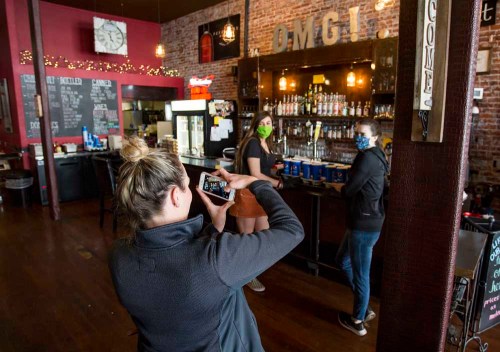Pendleton businesses struggle through shutdown
Published 6:00 am Saturday, April 18, 2020

- Shelby McQuinn takes a picture of Hally Halligan, left, and Reannah Thurman with McQuinn’s order of 12 milkshakes bound for Oregon Grain Growers Brand Distillery staff at OMG! Burgers & Brew in Pendleton on Thursday afternoon.
PENDLETON — The mad dash from local businesses following Gov. Kate Brown’s March orders to shut down dine-in restaurants and nonessential businesses has given way to uncertainty as business owners try to persist through a prolonged downturn in income.
Unless Congress takes further action, one of the lifelines for local businesses is already gone. On Thursday, the U.S. Small Business Administration announced that it had already run out of money for the $349 billion Paycheck Protection Program.
Interviewed weeks ahead of this development, some Pendleton business owners were already wary of getting the help they needed during the shutdown.
Prodigal Son Brewery & Pub was supposed to be celebrating its 10th anniversary this year, but it sits mostly empty during the stay home order.
Tim and Jennifer Guenther, the owners of Prodigal Son Brewery & Pub, feel confident they could reopen if the coronavirus suddenly disappeared tomorrow. But there’s far less certainty in Prodigal Son’s future when the shutdown remains indefinite.
The Guenthers said they tried switching to a takeout-only model like other restaurants did, but they couldn’t make it financially viable, so they were forced to lay off all employees at Prodigal Son, and their other bar, the Packard Tavern. The Prodigal Son now only operates to fill take-home growlers, while the Packard will temporarily reopen this Saturday to sell off its remaining inventory.
Jennifer Guenther said the longer they stay closed, the more expensive it will be to restart the business.
Tim Guenther said he would look into some of the federal stimulus programs that were created by the federal Coronavirus Aid, Relief, and Economic Security Act, but he wasn’t sure if he wanted to take on debt when there was little income coming into his business.
Pendleton Chamber of Commerce Executive Director Cheri Rosenberg said she’s finding many businesses in town are in the same boat.
“These are the things they are thinking about every single day,” she said.
Rosenberg said the chamber was forced to close because it’s considered a nonessential business. However, she’s never been busier, passing along critical information from the state and federal governments to local businesses.
She said the biggest obstacle for businesses right now is the uncertain timeline for the economy’s reopening. A shutdown that extends for several more months could mean more businesses stay closed for good, Rosenberg said.
With the future uncertain and government aid not a guarantee, Rosenberg said businesses are taking a self-reliant attitude and getting creative.
OMG! Burgers & Brew decided to use the shutdown to create a minimart in its now-empty restaurant.
While still offering takeout to customers, OMG! is now selling basic hygiene and food products, such as toilet paper, paper towels and loaves of bread.
OMG! co-owner Kimberly Burt said she hoped the market could serve older residents who couldn’t make it across town to the supermarket or who didn’t want to brave the crowds there.
While Burt said she was working with her accountant to get stimulus funds, other restaurateurs weren’t as keen on the programs the government was offering.
Joe’s Fiesta Mexican Restaurant owner Joe Meda said he laid off all of his employees, and now just he and his wife man the entire restaurant. He added that he’s appreciated all the community support Joe’s Fiesta has received since he switched to takeout, but business is still down as much as 70%.
Even if he applied for stimulus funding, Meda said he was skeptical it would ever reach him, with bailouts tending to go to the “fat cats” first instead of “skinny-ass alley cats” like him.
Great Pacific Wine and Coffee Co. manager Addison Schulberg said he wanted to see stimulus programs be more flexible. Instead of strictly focusing on covering expenses like payroll and utilities, Schulberg said he would like to see a grant or low-interest loan program allow businesses to use funds for renovations or special projects that would create excitement once the economy reopens.
But he was doubtful that Congress would approve such a program, and in the interim, he was hoping that the Oregon Liquor Control Commission would pass a temporary rule allowing bars to sell take-home cocktails.
In an attempt to fill in some of the gaps, the Pendleton City Council created its own emergency assistance program and gave it $100,000 in funding.
A Pendleton Development Commission program, it will act like a Paycheck Protection Program in miniature, providing businesses with a $2,000 grant for expenses like payroll, utilities, rent and inventory.
“We’re calling it the Pendleton Retail and Hospitality Relief Program because that’s just what it is,” councilor Paul Chalmers, the chairman of the commission, said. “We’ve worked so hard to build a strong, vibrant retail, dining and entertainment environment in downtown Pendleton. Now’s the time to assist its survival.”
With an application period running from Friday to April 23, if the city receives more applications than it has money for, it will pick businesses through a lottery.
At the virtual meeting where the council approved the program, some business owners felt like they were being left out because “essential” businesses like restaurants were being prioritized by the program.
Re-Ride owner Kristine Taylor told the council that she planned to apply for the new program, but she was concerned that she would have to deal with “a bazillion restaurants in front of me.”
Whatever the reservations, Rosenberg said all local business owners should apply for any aid that’s available to them.
Rosenberg said they could eventually decide to forgo the financial assistance because of the strings attached, but they will never have that option if they don’t seek it out.









